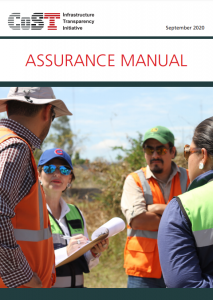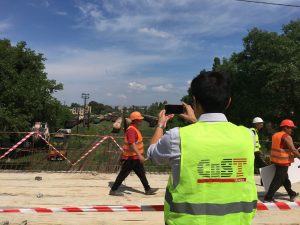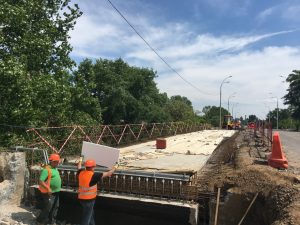Written by Natalie Forysuk, CoST Strategic Adviser for Ukraine and Former Ukraine Vice Minister for Infrastructure and John Hawkins, CoST Programme Director
This week, the UK hosts the annual Ukraine Recovery Conference which will focus on how the private sector can participate in the reconstruction of Ukraine.
The planning of the reconstruction of Ukraine is both hugely ambitious and impressive. Lessons have been learnt from past mistakes in post-war environments with a new digital management system that will help to ensure that transparency and integrity are at the heart of reconstruction. Transparency, accountability and the rule of law are then central to the Lugano principles agreed at last year’s Recovery Conference.
This is not surprising given that Ukraine has been a world leader in the transparency of public spending over the last decade centred on IT e-procurement system Prozorro and the development of data analytic tools that turned real-time data on thousands of road contracts into compelling information.
 Despite these reforms, one can see only small year-to-year improvements in the Transparency International’s Corruption Perception Index. Transparency is a powerful tool for preventing corruption, but it is not sufficient to ensure accountability and deliver quality infrastructure.
Despite these reforms, one can see only small year-to-year improvements in the Transparency International’s Corruption Perception Index. Transparency is a powerful tool for preventing corruption, but it is not sufficient to ensure accountability and deliver quality infrastructure.
In this blog, we highlight how using independent technical expertise to verify and analyse published data based on the CoST assurance process, can provide an important mechanism for bridging the accountability gap and help to optimise the performance of reconstruction.
A digital approach to transparency
Within a matter of weeks of Russia’s illegal war, the Government of Ukraine (GoU) began to develop an impressive Recovery Plan that identifies the priorities including strengthening institutional capacity, re-building a clean and safe environment, energy independence and a green deal, resolving logistical bottlenecks, EU integration, war recovery and modernisation of housing and social infrastructure.
There was also immediate pressure from civil society within Ukraine that recognised the serious risk of corruption, mismanagement, and inefficiency in the reconstruction. RISE Ukraine, which CoST is a member of, has been at the forefront of this effort, having been remarkably successful in convening local and international civil society around a common purpose.
To date, the efforts of RISE Ukraine and their government partners have focused on DREAM (Digital Restoration Ecosystem for Accountable Management) a digital reconstruction management ecosystem that will ensure the highest integrity and transparency standards in Ukraine’s recovery. It will allow anyone, anywhere, to monitor project performance and efficiency and use this information to mitigate risks, create accurate reporting, and improve the quality of infrastructure. The system has drawn lessons from the world leading Clean Construction System used in
Seoul, South Korea and will incorporate both the Open Contracting Data Standard developed by the Open Contracting Partnership (OCP) and the Open Contracting for Infrastructure Data Standard co-developed by OCP and CoST.
Can civil society monitor reconstruction?
Civil society has been instrumental in fighting corruption and ensuring the accountability of government following the Revolution of Dignity in 2014. For example, CoST Ukraine had a successful track record of training civil society organisations to use published data to monitor infrastructure projects and provide a vital feedback loop with regional governments.
The experience of working in more than 20 countries is that the assurance process is vital to ensure that transparency and accountability ultimately drive improvements in project performance.
They were able to gain good technical knowledge in order to carry out site visits and demand the repair of road construction defects that improved the quality of infrastructure including in Kherson, Kyiv and Lviv. In a post-war environment it may be dangerous to monitor infrastructure projects with the risk of unexploded ordinance, there must be a question mark about the extent to which civil society will be able to provide this oversight. 
Monitoring performance
The Recovery Plan emphasizes the importance of strengthening institutional capacity as a prerequisite for recovery. However, successive CoST Ukraine assurance reports have highlighted weaknesses in governance especially the rules, procedures and practices that operate within the roads sector creating a higher risk of mismanagement, waste and corruption.
Our experience of working in more than 20 countries is that the CoST assurance process is vital in bridging transparency with accountability and ultimately driving improvements in project performance.
It provides an independent review by technical experts of the published data drawing attention to problems as they occur before they significantly impact the quality and cost of an infrastructure project. The published report is balanced and factual with its recommendations of great interest to the media and other stakeholders.
Initially, this approach was applied by CoST Ukraine on three International Finance Institution (IFI) funded projects including the M-03 highway from Kyiv to Kharkhiv. The published reports remain a unique example of assisting civil society and media to shine a light on the performance of IFI investments in Ukraine. It identified several concerns including using incomplete designs leading to an increase in construction costs and delays project, a supervising engineer that was insufficiently independent and weak governance practices that required action.
CoST recently published a case study on the impact of increased infrastructure transparency in Ukraine that highlights how the evidence presented in subsequent assurance reports can be a catalyst for improving performance and market competition. This included the Ministry of Infrastructure introducing the role of an independent supervising engineer into its roads sector programme with all engineering services outsourced as open tenders.
Adopting CoST assurance as standard practice
If adopted as a standard practice, the assurance reports, with support from government, civil society and private sector, will be enormously valuable in highlighting the structural governance  weaknesses in reconstruction, recommending how this can be overcome. The evidence generated from this approach can also be used to influence any upgrade of DREAM.
weaknesses in reconstruction, recommending how this can be overcome. The evidence generated from this approach can also be used to influence any upgrade of DREAM.
We would also encourage the Multi-agency Donor Coordination Platform to consider how it incorporates a third-party independent review by technical experts helping to ensure the performance, quality and value for money of infrastructure investments are constantly monitored and improved.
CoST fully supports the approach of the Government of Ukraine to reconstruction and the development of DREAM and believes that the use of an independent review mechanism will help to bridge a potential accountability gap and help to deliver high quality infrastructure.
CoST will continue to support the people of Ukraine in any way it can. Learn more about our impact in improving infrastructure transparency in Ukraine.
